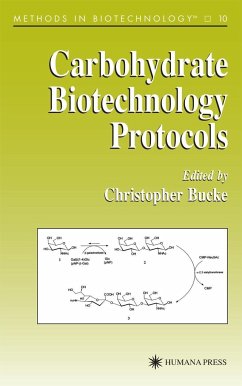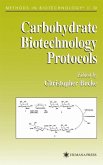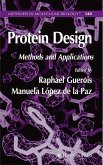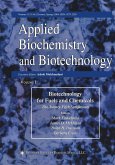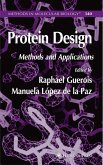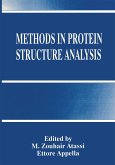We are in a phase of the evolution of biotechnology in which the true and potential commercial importance of carbohydrates is becoming appre- ated more fully. Progress in providing hard facts to establish the commercial value ofpolysaccharides and oligosaccharides is limited, as always, by lack of funding and by a relative shortage of skilled practitioners in the production and analysis of those materials. Carbohydrate science has a reputation, not unmerited, for technical difficulty owing to the structural similarity of the many monosaccharide monomers and the potential, and real, complexity of oligosaccharides and polysaccharides, particularly heterosaccharides conta- ing many different monomers. Modem analytical and synthetic methods, in many cases using enzyme technology, are beginning to allow this complexity to be unraveled. Carbohydrate Biotechnology Protocols is aimed at those newcomers who have an interest in the production and use of carbohydrate materials, but have shied away from involvement for lack of detailed descriptions of appropriate methods, including the type of practical hints that may be provided by those skilled in those methods, but that are rarely described in research papers. The majority of the contributions to this book conform to the established format of the Methods in Biotechnology series. They begin with the theoretical and c- mercial background to the method or group of methods, provide a list of the reagents and equipment required for the procedure, then give a detailed st- by-step description of how to carry out the protocol.
"...The recommendable book is very useful for students to start experiment work and for scientists and practitioners in doing experimental tasks."-Nahrung
"...the individual chapters are well written by subject matter authorities, and provide useful insights to the original research literature. The bench manual format of the book perhaps makes it most useful to active researchers interested in the specific protocols selected for this volume, although a wealth of interesting information is found among the chapter introductions and notes."-ASM News
"Each chapter of the volume is armed with necessary literature references, as basic sources of knowledge. The contributions throughout the book are easily readable and understandable, this is why I recommend the book not only to experts in synthetic chemistry, biochemistry, fermentation biotechnology, and applied enzymology, but also to beginners and students who are new to the field of carbohydrate biotechnology.-Models of Chemistry
"The protocols are clearly arranged and begin with a short theoretical and commercial background of the method, the list of reagents and equipment and continue with a comprehensive step-by-step description and a set of notes. Such procedure saves time of the user, indicating quickly which problems are likely to arise. The recommendable book is very useful for students to start experimental work and for scientists and practitioners in doing experimental tasks."-Nahrung
"...a valuable resource to more-experienced practitioners who require alternative methodologies....this volume will prove a useful resource for researchers of graduate level and above, with an interest in investigating carbohydrate biochemistry as applied to the fields of biotechnology and pharmacology." - Tibtech
"...the individual chapters are well written by subject matter authorities, and provide useful insights to the original research literature. The bench manual format of the book perhaps makes it most useful to active researchers interested in the specific protocols selected for this volume, although a wealth of interesting information is found among the chapter introductions and notes."-ASM News
"Each chapter of the volume is armed with necessary literature references, as basic sources of knowledge. The contributions throughout the book are easily readable and understandable, this is why I recommend the book not only to experts in synthetic chemistry, biochemistry, fermentation biotechnology, and applied enzymology, but also to beginners and students who are new to the field of carbohydrate biotechnology.-Models of Chemistry
"The protocols are clearly arranged and begin with a short theoretical and commercial background of the method, the list of reagents and equipment and continue with a comprehensive step-by-step description and a set of notes. Such procedure saves time of the user, indicating quickly which problems are likely to arise. The recommendable book is very useful for students to start experimental work and for scientists and practitioners in doing experimental tasks."-Nahrung
"...a valuable resource to more-experienced practitioners who require alternative methodologies....this volume will prove a useful resource for researchers of graduate level and above, with an interest in investigating carbohydrate biochemistry as applied to the fields of biotechnology and pharmacology." - Tibtech

